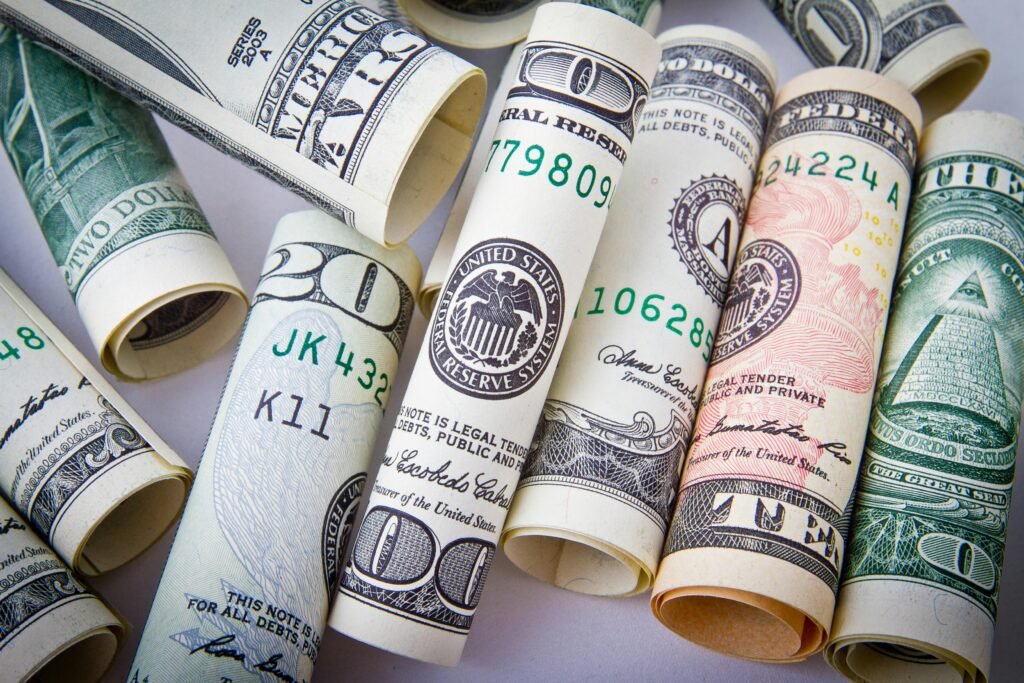Personal Finances 1
como economizar dinheiro, como investir, como organizar finanças, dicas de finanças, economia pessoal, finanças nos Estados Unidos, finanças pessoais, finanças saudáveis, fundo de emergência, investimentos, orçamento pessoal, organizar finanças pessoais, organizar orçamento, pagar dívidas, planejamento financeiro
Tayrine Campos
5 months ago
0 Comments
How to Organize Your Personal FinancesHow to Organize Your Personal Finances in 2025
rganizing your personal finances is a crucial step in ensuring financial stability and achieving your goals. Many people struggle with managing their income and expenses, which can lead to debt and a lack of future planning. However, following a few simple steps can help you gain more control over your money.
In this post, you will learn 5 essential steps to organize your personal finances, from assessing your current situation to planning for future investments.
1. Assess Your Current Financial Situation.
The first step in organizing your personal finances is to understand exactly where you stand. Knowing how much you earn, how much you spend, and where you can improve are essential pieces of information for planning your next financial moves. Without this diagnosis, making sound decisions becomes difficult.
Before making any changes, you need to understand your current financial situation. This includes knowing how much you earn, how much you spend, and where you can save. Without this knowledge, it’s impossible to create an effective plan.
How to assess your finances?
- List all your income sources (salary, freelance work, passive income).
- Track all your expenses, separating fixed costs (rent/mortgage, utilities, internet, insurance) from variable costs (entertainment, dining out, shopping).
- Use budgeting apps like Mint, YNAB (You Need a Budget), or Personal Capital to automate tracking.
The goal of this analysis is to identify unnecessary expenses and find opportunities to save. Many people underestimate small daily expenses, but these add up significantly over time. Organizing your personal finances is crucial for achieving financial stability and reaching your long-term goals. Here’s a concise guide on How to Organize Your Personal Finances:
1. Assess Your Financial Situation
Begin by evaluating your current financial standing. Compile a list of your assets (such as savings accounts, investments, and property) and liabilities (including credit card debt, loans, and mortgages). Understanding your net worth provides a clear picture of your financial health and serves as a foundation for your financial planning.
principal.com
2. Set Clear Financial Goals
Define both short-term and long-term financial objectives. Short-term goals might include creating an emergency fund or paying off a specific debt, while long-term goals could involve saving for retirement or purchasing a home. Having clear goals will guide your financial decisions and motivate you to stay on track.
library.everyincome.com
3. Create a Budget
Develop a budget that outlines your monthly income and expenses. Categorize your spending into essentials (like housing and utilities) and non-essentials (such as dining out and entertainment). This will help you identify areas where you can cut back and allocate more funds toward your financial goals.
nerdwallet.com
4. Build an Emergency Fund
Establish an emergency fund to cover unexpected expenses, such as medical bills or car repairs. Aim to save at least three to six months’ worth of living expenses. This fund acts as a financial safety net, preventing you from accumulating debt during unforeseen circumstances.
td.com
5. Monitor and Adjust Your Plan
Regularly review your financial plan to ensure you’re progressing toward your goals. Life circumstances and financial markets can change, so it’s important to adjust your budget, savings, and investment strategies as needed. Staying proactive will help you maintain control over your personal finances.
wealthkeel.com
By following these steps on How to Organize Your Personal Finances in 5 Steps, you can create a solid foundation for financial well-being and work toward a secure future.

2. Create a Realistic Monthly Budget
After analyzing your finances, it’s time to organize your personal finances with a monthly budget. A well-made budget helps allocate your money efficiently, ensuring that you cover your essential needs while also saving or investing for the future.
Now that you understand your income and expenses, it’s time to set up a realistic monthly budget. A budget helps you allocate your money efficiently and avoid overspending How to Organize Your Personal Finances.
How to create an effective budget?
A popular method is the 50/30/20 rule:
- 50% for necessities: rent/mortgage, groceries, transportation, utilities, health insurance.
- 30% for discretionary spending: entertainment, dining out, hobbies, travel.
- 20% for savings and debt payments: emergency fund, retirement savings, paying off credit card debt.
If your essential expenses exceed 50% of your income, you may need to adjust your lifestyle by cutting unnecessary costs. If your discretionary spending is too high, look for more affordable entertainment options.
Tips to stick to your budget: (Organize Your Personal)
- Review your spending regularly to ensure you’re staying on track.
- Use budgeting envelopes or a digital equivalent to manage spending categories.
- Adopt the habit of tracking your expenses daily to avoid surprises.
Following a budget may seem challenging at first, but with time, it will become second nature and improve your financial well-being.
3. Build an Emergency Fund
No matter how well you have organized your personal finances, unexpected situations happen. Having an emergency fund is key to dealing with these situations without hurting your financial planning or resorting to high-interest debt How to Organize Your Personal Finances.
Unexpected events happen—job loss, medical emergencies, or urgent home repairs. Having an emergency fund ensures that you don’t have to rely on credit cards or loans with high interest rates.
How to build an emergency fund?
- Aim to save 3 to 6 months’ worth of living expenses. If your monthly expenses are $3,000, your emergency fund should be between $9,000 and $18,000.
- Start by saving 10% of your income monthly, if possible. If not, start small and gradually increase your savings.How to Organize Your Personal Finances
- Keep the money in a high-yield savings account or a liquid investment, such as a money market account or Treasury bills.
An emergency fund provides financial security and prevents you from going into debt due to unexpected expenses.
To further enhance your understanding of How to Organize Your Personal Finances, consider the following additional strategies:
1. Automate Your Savings and Payments
Automating your financial processes can significantly improve efficiency and ensure consistency.
- Automate Savings: Set up automatic transfers from your checking account to your savings or investment accounts. This “pay yourself first” approach ensures that a portion of your income is consistently directed toward your financial goals without relying on manual intervention.
- Automate Bill Payments: Enroll in automatic bill payment services for recurring expenses such as utilities, loans, and subscriptions. This practice helps prevent late payments, avoiding associated fees and potential credit score impacts.
2. Review and Optimize Subscriptions and Recurring Expenses
Regularly auditing your recurring expenses can lead to substantial savings.
- Assess Subscriptions: Compile a list of all active subscriptions, including streaming services, gym memberships, and software renewals. Determine which ones provide genuine value and cancel those that are underutilized.
- Negotiate Bills: Contact service providers for internet, cable, or insurance to inquire about available discounts or more affordable plans. Often, providers offer promotions or loyalty discounts that can reduce your monthly expenses.
3. Educate Yourself on Financial Literacy
Enhancing your financial knowledge empowers you to make informed decisions.
- Read Financial Literature: Engage with reputable personal finance books, blogs, and articles to broaden your understanding of money management principles How to Organize Your Personal Finances.
- Attend Workshops and Seminars: Participate in financial workshops or webinars that cover topics like investing, retirement planning, and debt management. Continuous learning keeps you informed about best practices and emerging financial strategies.
By implementing these steps, you can gain greater control over your financial landscape, paving the way for a secure and prosperous future.

4. Pay Off Debt and Avoid High-Interest Rates
If you have outstanding debt, your priority should be to pay it off as soon as possible, since interest can make small balances grow significantly over time. How to Organize Your Personal Finances
How to get out of debt?
- List all your debts: note the total amount, interest rates, and due dates.
- Prioritize high-interest debt: focus on paying off credit card balances and payday loans first.
- Consider the Avalanche or Snowball method:
- Avalanche method: Pay off the highest-interest debt first (most cost-effective).
- Snowball method: Pay off the smallest debt first for quick wins and motivation.
- Negotiate lower interest rates: Call your credit card company or lender to request a better rate or consolidate debt into a lower-interest loan.
- Avoid new unnecessary debt: Only use credit when necessary and ensure you can repay it in full each month.
By eliminating debt, you free up money for saving and investing, improving your overall financial stability.
To further enhance your understanding of How to Organize Your Personal Finances, consider the following additional strategies:
1. Consolidate and Simplify Accounts
Managing multiple financial accounts can become overwhelming and may lead to oversight.
- Streamline Financial Accounts: Consider consolidating similar accounts, such as multiple savings or checking accounts, into a single account to simplify management. This approach reduces complexity and helps in maintaining a clear overview of your financial status How to Organize Your Personal Finances.
- Simplify Investment Portfolios: If you have various investment accounts, evaluate the possibility of merging them or focusing on a diversified portfolio within a single account. This strategy can make tracking performance and rebalancing more straightforward.
2. Protect Your Financial Information
Safeguarding your financial data is crucial in the digital age.
- Secure Personal Information: Ensure that sensitive financial documents are stored securely, whether physically in a safe or digitally with encryption. Regularly update passwords and be vigilant against phishing attempts How to Organize Your Personal Finances.
- Monitor Credit Reports: Regularly reviewing your credit reports can help detect and address fraudulent activities promptly. Utilize free annual credit report services to stay informed about your credit status.
5. Start Investing for Your Future
Once your finances are under control and you’ve paid off debt, the next step is to make your money work for you through investments.
Why is investing important?
Investing allows your money to grow over time, helping you achieve goals such as a comfortable retirement, buying a home, or financial independence.
How to start investing?
- Define your financial goals: Are you saving for retirement, a house, or a major life event?
- Determine your risk tolerance: Are you conservative, moderate, or aggressive?
- Choose the right investment options:
- 401(k) or IRA: If your employer offers a 401(k) with matching contributions, contribute at least enough to get the full match—it’s free money!
- Index Funds and ETFs: Low-cost, diversified options for long-term growth.
- High-yield savings accounts: A safe place for short-term savings.
- Stocks and real estate: Options for those willing to take more risk for higher returns.
The key is to start as early as possible, even with small amounts. Compound interest makes a huge difference over time!

Organizing your personal finances is not just about tracking expenses; it’s about taking control of your financial future. By understanding where your money goes, setting clear goals, and developing a disciplined approach to saving and investing, you create a roadmap for financial freedom How to Organize Your Personal Finances. These steps are designed to help you reduce financial stress, prepare for unexpected expenses, and ensure that you’re on the right path toward reaching your financial dreams. Whether you’re saving for a house, planning for retirement, or just trying to stay debt-free, these strategies can make a huge difference.
To learn more about “Expense Control: Easy and Advanced Strategies to Save in 2025”, I recommend the following article:
“Daily Expenses: Easy Methods and Advanced Strategies to Control and Save in 2025”: This article offers practical methods and advanced strategies to manage and save on daily expenses.
This resource will provide a solid foundation for implementing effective expense control strategies andeconomia em 2025.
Conclusion
How to Organize Your Personal Finances
Organizing your personal finances may seem overwhelming at first, but by following these five essential steps, you’ll gain control over your money and build a solid financial future.
Recap:
✅ Assess your current financial situation to understand your income and expenses.
✅ Create a realistic budget using the 50/30/20 rule.
✅ Build an emergency fund to cover unexpected expenses.
✅ Pay off debt quickly to avoid high-interest costs.
✅ Start investing to grow your wealth over time.
Now that you know how to organize your finances, take action today! Small changes can lead to big financial improvements over time.
If you found these tips helpful, share them with friends and family to help more people take control of their finances!
To take a deeper look at controlling your daily spending, I recommend the following resources:
GuiaBolso
A free app that helps you control your daily expenses and spending, automatically synchronizing with your bank account and categorizing your spending to make it easier to identify your main sources of consumption. How to Organize Your Personal Finances

Organize Your Personal Finances para 2025 How to Organize Your Personal Finances
Manter suas finanças pessoais organizadas é essencial para alcançar estabilidade financeira e atingir suas metas econômicas. Aqui estão algumas estratégias para ajudá-lo a organize your personal finanças de forma eficaz:
- Crie um Orçamento Detalhado: Desenvolva um orçamento mensal que inclua todas as suas fontes de renda e categorize suas despesas. Isso permitirá que você identifique áreas onde pode reduzir gastos e alocar recursos de maneira mais eficiente.
- Utilize Ferramentas Digitais: Aproveite aplicativos e softwares de gerenciamento financeiro para monitorar suas transações, acompanhar investimentos e planejar pagamentos de contas. Essas ferramentas facilitam o processo de organize your personal finanças ao fornecer uma visão clara de sua situação financeira.
- Estabeleça Metas Financeiras Claras: Defina objetivos financeiros de curto e longo prazo, como criar um fundo de emergência, quitar dívidas ou poupar para a aposentadoria. Metas bem definidas ajudam a direcionar seus esforços e a manter o foco no que é importanteHow to Organize Your Personal Finances.
- Revise Regularmente Suas Finanças: Agende revisões financeiras periódicas para avaliar seu progresso em relação às metas estabelecidas e fazer ajustes conforme necessário. Isso garante que você permaneça no caminho certo e possa adaptar seu plano financeiro a mudanças nas circunstâncias pessoais ou econômicas.
- Eduque-se Continuamente: Busque conhecimento sobre finanças pessoais por meio de cursos, workshops ou leitura de materiais especializados. Quanto mais informado você estiver, mais capacitado estará para tomar decisões financeiras inteligentes e organize your personal finanças de maneira eficaz.
Implementando essas estratégias, você poderá organize your personal finanças de forma mais eficiente, preparando-se para um futuro financeiro mais seguro e próspero em 2025 e além.
Related Reading:
For a deeper dive into the topic of “Expense Control: Simple and Advanced Strategies to Save Money in 2025,” I recommend the following article:
Best Budgeting Apps to Manage Your Money.
“Expense Control: Simple and Advanced Strategies to Save Money in 2025”:
This resource will provide a solid foundation for implementing expense control and savings strategies in 2025.

Share this content:




Post Comment